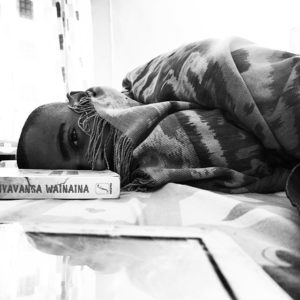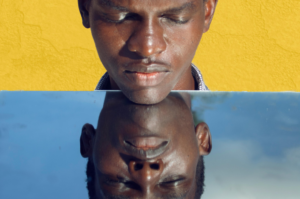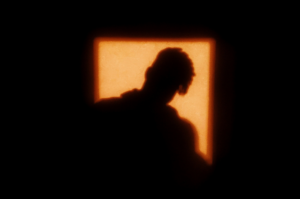
THE DOCTOR says I’ve got a hole in my heart. I tell him that I am aware. I tell him that it is you who dug it in there.
He sits opposite me, the doctor, a clean-shaven man with warm eyes that gather moist whenever he blinks. His eyes, they look like yours.
He looks at me with worry furrowed on his forehead. He makes to say something but changes his mind before the words take flight. He scans through my form a second time.
—You’ve been married for how long? he asks.
—Ten years, I say. I do not take my eyes off his.
—Any kids?
Silence.
—Does your husband abuse you, Madam?
Silence.
—I do not mean to pry, I’m only trying to understand what you mean.
I look away. I do not want his pity.
He waits a few more seconds, and when I still do not answer, he hands me a scribbled note and a printed copy of my enchocadiogram in a white envelope.
—The medication should ease things for now, but at this point, I’m afraid surgery is inevitable.
The words float out of his mouth, each like warmth encased in a bubble. They float in the artificial cold of the room, and when they find me, they burst open.
—He never hit me, I say, not once.
If the doctor is taken aback by my sudden response he doesn’t show it. He listens uninterrupting, a silence that nurtures the words out of the hole in my heart and I purge, same way I do standing before my mirror on days when agony calls me by name; days when I clutch my belly with nails digging deep, mourning the seven foetuses that long fell from within it, unbaked, never finding a home in my arms.
The doctor only lets me go when I have nothing more to say. He makes me leave with a promise to come with you for my next appointment.
No. I do not tell him of your happiness, of a second home with your mistress and three happy children, or that you only return to me once in a week out of some unsaid obligation.
I was once this happiness until I was not.
Outside the doctor’s office, I squeeze the paper and the envelope. I toss them in a bin and I head home.
*
Months later, on the night you are to find out, you would feel anger first, and then despair, at my refusal to speak to one of your many doctor friends, at my refusal of life. You would go on a calling spree, asking family and friends, anyone, asking them to beg me, talk some sense into me. You would refuse to return to your happiness, your mistress, your kids, choosing instead to not leave me by myself. And for the first time in years, before happiness, like water dripping into a sieve, sipped from our lives, you would touch me. You would hold on to me and cry. You would apologise for all the pain.
—I do not want your pity, I would try to say, but the words would never find voice, they would trip over and over into the pit you’ve dug in my heart.
About the Author:
 Eric Atie is a graduate of the University of Lagos, Nigeria. He is a creative photographer and a short story writer who is passionate about African Literature. He is currently working on his debut short story collection.
Eric Atie is a graduate of the University of Lagos, Nigeria. He is a creative photographer and a short story writer who is passionate about African Literature. He is currently working on his debut short story collection.









Your biggest fan October 19, 2017 19:55
Eric I totally love you!!!